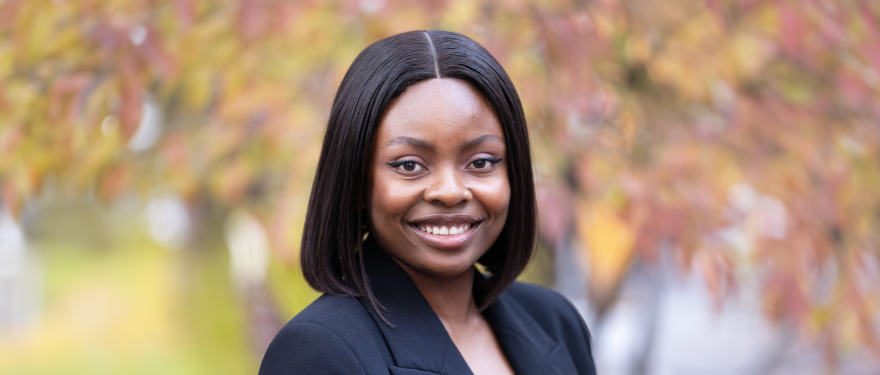Abisinuola David-Olusa (MBA 2024) is a recent graduate from Nigeria. Prior to HBS, she worked with an African-focused private equity fund deploying capital for infrastructure investing. At HBS, she was Section E’s Education Representative, and actively involved in Women in Investing Club, African Business Club and Black Investment Club.
Could you describe your professional journey before attending Harvard Business School, and what motivated you to pursue an MBA at HBS?
Before HBS, my academic and professional journey was in finance and investment on the African continent. After undergrad, I joined an investment bank where I gained valuable experience in financial analysis and then transitioned to a pan-African infrastructure fund. I was deeply involved in the investment lifecycle, from due diligence and financial modeling to project execution and portfolio management. One of my most significant contributions was helping deploy capital to a renewable energy company aimed at providing clean energy access for commercial and industrial users in Africa. This project was instrumental in advancing clean energy adoption and economic growth across the continent.
My motivation to pursue an MBA stemmed from a desire to deepen my leadership skills and pursue infrastructure investing on a global scale, allowing me to have a far-reaching impact. The HBS curriculum, known for its case method and emphasis on real-world problem solving, offered the perfect environment to refine these skills. Also, the diverse HBS class provided me the opportunity to leverage resources and communities to successfully transition to a global fund.
How did your background and experience in infrastructure shape the perspectives you brought to the HBS class discussions, and how do you expect what you learned from the program to shape your perspective and approach to infrastructure investing?
My background in infrastructure investing on the African continent and my background growing up in Nigeria allowed me to bring a unique perspective to class in my first year. I remember a case on Nigeria being taught for the first time in my Business, Government and International Economy (BGIE) class. My ability to provide historical context underlying some of the political challenges allowed my class to gain a better understanding of the case. I have also been able to compare my investing experience with my HBS classmates who worked in more developed markets, allowing me fill knowledge gaps. It wasn’t until I took classes like Global Climate Change with Professor Gunnar Trumbull and worked on an Independent Project with Professor Willy Shih that I fully understood the energy transition technologies that global businesses are using to tackle climate change.
What do you believe are some of the most critical challenges and opportunities in the infrastructure investing landscape?
There are significant opportunities in infrastructure investing, particularly given its recession-proof and resilient nature. This is one of the reasons why the sector continued to thrive in the past year despite slow economic growth. The increasing global focus on decarbonization and climate resilience presents opportunities for investments in renewable energy, smart grids, and green transportation systems. Following the Paris Agreement, various countries and industries have set decarbonization targets as we transition from fossil fuels to more sustainable energy solutions, and these require resilient infrastructure.
What advice would you give to current and prospective HBS students who are looking to pivot into infrastructure investing?
It is important to develop a strong understanding of the infrastructure investing landscape and how the industry has evolved from a risk-return perspective. For current students focused on recruiting, build your technical skills through Career & Professional Development training like Wall Street Prep and Training the Street. Also, engage with classmates, the investing clubs, and professors, which will provide you with networking opportunities and practical insights into the industry. Additionally, stay updated on regulatory changes and sustainability trends, which are increasingly shaping the field.
How do you plan on continuing to leverage the HBS network going forward to continue to deepen your knowledge of climate & infrastructure investing?
It seems like almost every student club has an active alumni extension! I have joined specific clubs aligned with my career interests like the alumni community of the HBS Business and Environment Initiative and the Harvard Alumni for Climate and Environment. I see this as an opportunity to engage in lifelong learning opportunities and forge deeper connections with professors and fellow alumni.

